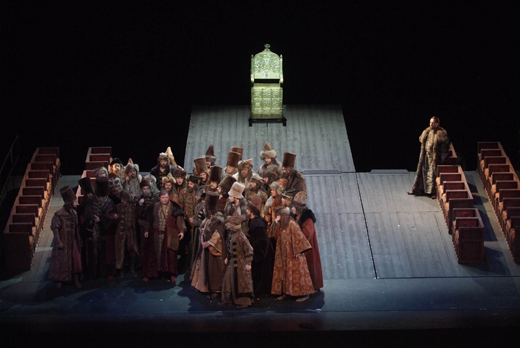 Spain M. Musorgsky, Boris Godunov: Soloists, Orquestra de la Comunitat Valenciana, Cor de la Generalitat Valenciana, Omer Meir Wellber (conductor), Palau de Les arts de Valencia, 8.11.2011 (JMI)
Spain M. Musorgsky, Boris Godunov: Soloists, Orquestra de la Comunitat Valenciana, Cor de la Generalitat Valenciana, Omer Meir Wellber (conductor), Palau de Les arts de Valencia, 8.11.2011 (JMI)
New Production: Valencia’s Palau de les Arts, Torino’s Teatro Regio and Bari’s Teatro Petruzelli
Direction: Andrei Konchalovski
Sets: Graziano Gregori
Costumes: Carla Teti
Lighting: Andrei Konchalovski
Cast
Boris Godunov: Orlin Anastassov
Pimen: Alexander Morozov
Varlaam: Vladimir Matorin
Shuiski: Konstantin Pluzhnikov
Dimitri: Nikolai Schukoff
Schelkalov: Alexander Gergalov
Xenia: Ilona Mataradze
Fiodor: Ivan Kudhyakov
Innkeeper: Nadezhda Serdyuk
Nurse: Nadezhda Vasilieva
Missail: Emilio Sanchez
The Fool: Andrei Zorin

Valencia’s Palau de Les Arts opened its sixth opera season with Modest Musorgsky’s Boris Godunov. It is the first season without Lorin Maazel as musical director and there were doubts among aficionados about the void Mr. Maazel departure might leave. The draw of his name alone was important for such a young institution and Valencia has enjoyed several great performances under his baton in the last few years. So far, things have worked well, even if Omer Meir Wellber cannot yet quite fill Maazel’s shoes.
This Boris can be summarized with “great production, good playing, modest singing”. Most pointedly the cast was weaker this year than in previous ones; perhaps a sign of Maazel’s draw missing, though more likely that of the economic crisis taking its toll.
In his return to opera for the first time in ten years, film- and theater director Andrei Konchalovsky—perhaps best known for his Mariinsky production of War & Peace, created something remarkable. It premiered in October last year in Turin and brings the original version from 1869—the shortest one—to the stage, but with the Kromy forest scene tucked on.
The production is modern and traditional, with great attention to details. The minimalist scenes show a stage with large spaces, closed at the back by a wall; converted into a screen, when lifted. The intelligent use of stage props gives sense to the different scenes and there are some very attractive costumes from the times of Tsar Boris, carefully designed in every detail, nicely contrasting plain folks from boyars. Sparse sets make lighting very important, which Konchalovsky, too, solved very well.
  M.Musorgsky, Boris Godunov, 1869 & 1872 Versions Gergiev / Mariinsky (Kirov Opera) Philips     |
Especially good was the stage direction and the blocking—so important in this opera where hordes of the ‘suffering masses’ have to be shifted back and forth, constantly, with Konchalovsky honing in on the struggle between the powerful boyars and the ever-downtrodden people.
After guest conducting several times last season, young (30) Omer Meir Wellber made his debut as music director of the Palau de Les Arts. The Orchestra continues to be on its ways to becoming one of the best pit orchestras in the world—an evolution that will also depend on the work of its new director and on how the current financial crisis plays out. As for this occasion, the impression gathered was a positive one, with smudges. Meir Wellber, ever in perfect control of stage and pit, shone in the ensembles but lacked depth and emotion in the more intimate scenes. The chorus, now no longer an amateur group, proved to be one of the best in Spain
Tsar Boris was sung well by young Bulgarian bass-baritone Orlin Anastassov. His biggest problem is that he rarely projects his voice properly. Fortunately, Palau de Les Arts is more friendly in this regard than Bilbao’s Euskalduna and Mr. Anastassov was much better off than last month in Bilbao, where he sang Fiesco in Simon Boccanegra. His death scene was especially good, but a soupcon more emotion would have gotten the audience moved, too.
Veteran Russian bass Alexander Morozov was correct as Pimen, but hasn’t quite the necessary volume and his scene with monk Grigory fell flat: a more important voice is needed for this character. Vladimir Matorin is a regular in Valencia and his convincing Varlaam, a character that suits him very well, was excellent.
Prince Shuiski as Konstantin Pluzhnikov is a pure character tenor and took refuge in parlando more than singing. Nikolai Schufoff was well suited as Grigory or “False Dimitri” with his pleasant voice, but in this version, the character’s importance is limited. We’ll see him again as Bacchus in Ariadne auf Naxos.
The rest, except for the child that played Fyodor, was below average or unconvincing.
José M. Irurzun